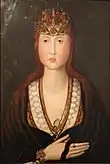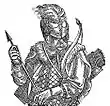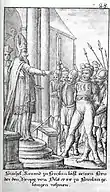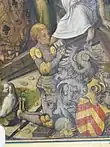1452
Year 1452 (MCDLII) was a leap year starting on Saturday (link will display the full calendar) of the Julian calendar.
| Millennium: | 2nd millennium |
|---|---|
| Centuries: | |
| Decades: | |
| Years: |
| 1452 by topic |
|---|
| Arts and science |
|
| Leaders |
|
| Birth and death categories |
| Births – Deaths |
| Establishments and disestablishments categories |
| Establishments – Disestablishments |
| Art and literature |
| 1452 in poetry |
| Gregorian calendar | 1452 MCDLII |
| Ab urbe condita | 2205 |
| Armenian calendar | 901 ԹՎ ՋԱ |
| Assyrian calendar | 6202 |
| Balinese saka calendar | 1373–1374 |
| Bengali calendar | 859 |
| Berber calendar | 2402 |
| English Regnal year | 30 Hen. 6 – 31 Hen. 6 |
| Buddhist calendar | 1996 |
| Burmese calendar | 814 |
| Byzantine calendar | 6960–6961 |
| Chinese calendar | 辛未年 (Metal Goat) 4148 or 4088 — to — 壬申年 (Water Monkey) 4149 or 4089 |
| Coptic calendar | 1168–1169 |
| Discordian calendar | 2618 |
| Ethiopian calendar | 1444–1445 |
| Hebrew calendar | 5212–5213 |
| Hindu calendars | |
| - Vikram Samvat | 1508–1509 |
| - Shaka Samvat | 1373–1374 |
| - Kali Yuga | 4552–4553 |
| Holocene calendar | 11452 |
| Igbo calendar | 452–453 |
| Iranian calendar | 830–831 |
| Islamic calendar | 855–856 |
| Japanese calendar | Hōtoku 4 / Kyōtoku 1 (享徳元年) |
| Javanese calendar | 1367–1368 |
| Julian calendar | 1452 MCDLII |
| Korean calendar | 3785 |
| Minguo calendar | 460 before ROC 民前460年 |
| Nanakshahi calendar | −16 |
| Thai solar calendar | 1994–1995 |
| Tibetan calendar | 阴金羊年 (female Iron-Goat) 1578 or 1197 or 425 — to — 阳水猴年 (male Water-Monkey) 1579 or 1198 or 426 |
Events
January–December
- February – Alexăndrel retakes the throne of Moldavia, in his long struggle with Petru Aron.
- February 22 – William Douglas, 8th Earl of Douglas is killed by James II of Scotland, at Stirling Castle.
- March 17 – Reconquista – Battle of Los Alporchones (around the city of Lorca in Murcia): The combined forces of the Kingdom of Castile, and its subsidiary kingdom of Murcia, defeat the Emirate of Granada.[1]
- March 19 – Frederick III, Holy Roman Emperor, becomes the last to be crowned in Rome.[2]
- May 31 – Revolt of Ghent: Philip the Good, Duke of Burgundy, officially declares war on Ghent.
- June 18 – Pope Nicholas V issues the bull Dum Diversas, legitimising the colonial slave trade.
- October
- English troops under John Talbot, 1st Earl of Shrewsbury, land in Guyenne, France, and retake most of the province without a fight.
- Byzantine–Ottoman Wars: The Ottoman governor of Thessaly, Turakhan Beg, breaks through the Hexamilion wall for the fourth time, and ravages the Peloponnese Peninsula to prevent the Byzantine Despotate of the Morea from assisting Constantinople, during the final Ottoman siege of the imperial capital.[3]
Date unknown
- A major volcanic eruption, 1452/1453 mystery eruption, has a subsequent global cooling effect (the eruption releases more sulfate than any other event in the previous 700 years).
- Portuguese navigator Diogo de Teive discovers the islands of Corvo and Flores, in the Azores.
- Battle of Bealach nam Broig, a Scottish clan battle.
- Edinburgh officially becomes the capital of the Kingdom of Scotland.[4]
Births

Joanna, Princess of Portugal
- February 6 – Joanna, Princess of Portugal (d. 1490)
- February 14
- March 10 – King Ferdinand II of Aragon, Aragonese king and first king of a united Spain (by marriage to Isabella of Castile) (d. 1516)[6]
- April 15 – Leonardo da Vinci, Italian artist and inventor (d. 1519)[7]
- April 19 – King Frederick of Naples (d. 1504)[8]
- May 18 – Henry the Younger of Poděbrady, Bohemian nobleman (d. 1492)
- July 27
- Ludovico Sforza, Duke of Milan (d. 1508)[9]
- Lucrezia Crivelli, mistress of Ludovico Sforza (d. 1508)
- August 12 – Abraham Zacuto, Spanish Jewish astronomer, astrologer, mathematician, rabbi and historian (d. 1515)
- September 21 – Girolamo Savonarola, Italian religious reformer (d. 1498)[10]
- October 2 – King Richard III of England (d. 1485)[11]
- December 6 – Antonio Mancinelli, Italian humanist pedagogue and grammarian (d. 1505)
- December 10 – Johannes Stöffler, German mathematician (d. 1531)
- Date unknown
Deaths


Švitrigaila and Michał Bolesław Zygmuntowicz (Michael Žygimantaitis) died on February 10, 1452

Konrad VII the White

Reinhard III, Count of Hanau
- February 10
- Švitrigaila, Grand Prince of Lithuania
- Michał Bolesław Zygmuntowicz (Michael Žygimantaitis), Prince of Black Ruthenia
- February 14 – Konrad VII the White, Duke of Oleśnica
- February 22 – William Douglas, 8th Earl of Douglas (b. 1425)
- April 20 – Reinhard III, Count of Hanau (1451–1452) (b. 1412)
- May – John Stafford, Archbishop of Canterbury[12]
- October – Nicholas Close, English bishop
- probable – Gemistus Pletho, Greek philosopher
References
- Thomas Devaney (April 3, 2015). Enemies in the Plaza: Urban Spectacle and the End of Spanish Frontier Culture, 1460-1492. University of Pennsylvania Press. p. 158. ISBN 978-0-8122-9134-6.
- "Historical Events in 1452". OnThisDay.com. Retrieved August 8, 2017.
- Setton, Kenneth M. (1978). The Papacy and the Levant (1204–1571), volume II: The Fifteenth Century. DIANE Publishing. p. 146. ISBN 0-87169-127-2.
- "Why is Edinburgh the capital of Scotland?". Edinburgh Tourist. June 20, 2018. Retrieved July 25, 2021.
- Ira Moskowitz (1976). Great Drawings of All Time: Italian, thirteenth through nineteenth century. Kodansha International. p. 139. ISBN 978-0-87011-263-8.
- "Ferdinand II | Biography & Facts". Encyclopedia Britannica. Retrieved June 30, 2020.
- "Leonardo da Vinci | Biography, Art, & Facts". Encyclopedia Britannica. Retrieved May 3, 2019.
- Richard J. Walsh (2005). Charles the Bold and Italy (1467-1477): Politics and Personnel. Liverpool University Press. p. 302. ISBN 978-0-85323-838-6.
- Grolier Incorporated (1997). Academic American encyclopedia. Grolier. p. 233. ISBN 9780717220687.
- Sandro Botticelli; Musée national du Luxembourg (France); Palazzo Strozzi (Florence, Italie). (2003). Botticelli: From Lorenzo the Magnificent to Savonarola. Skira. p. 227. ISBN 978-88-8491-565-8.
- "Richard III | Biography & Facts". Encyclopedia Britannica. Retrieved June 26, 2020.
- Fryde, E. B.; Greenway, D. E.; Porter, S.; Roy, I. (1996). Handbook of British Chronology (Third revised ed.). Cambridge: Cambridge University Press. p. 233. ISBN 0-521-56350-X.
This article is issued from Wikipedia. The text is licensed under Creative Commons - Attribution - Sharealike. Additional terms may apply for the media files.